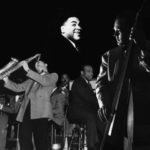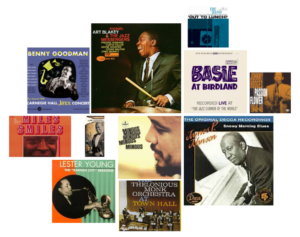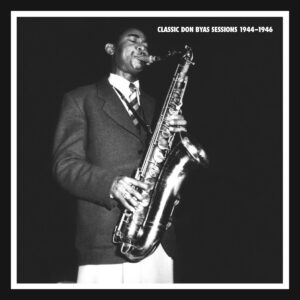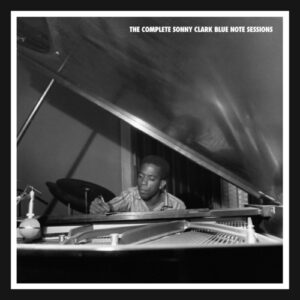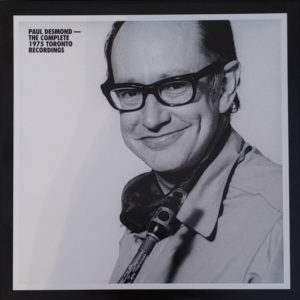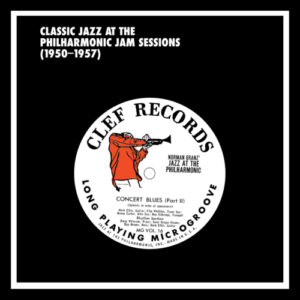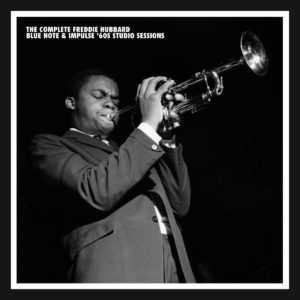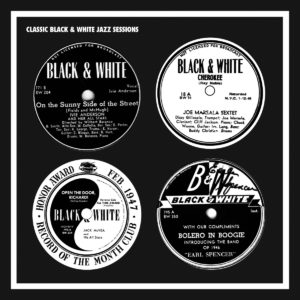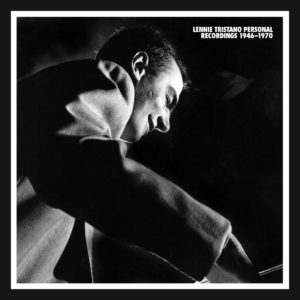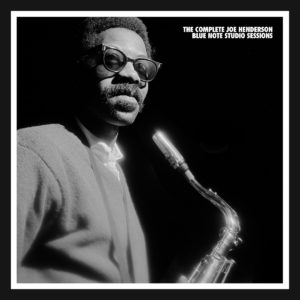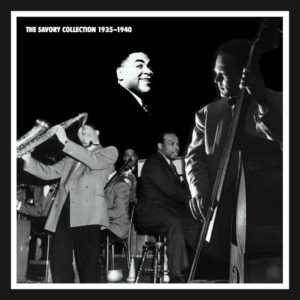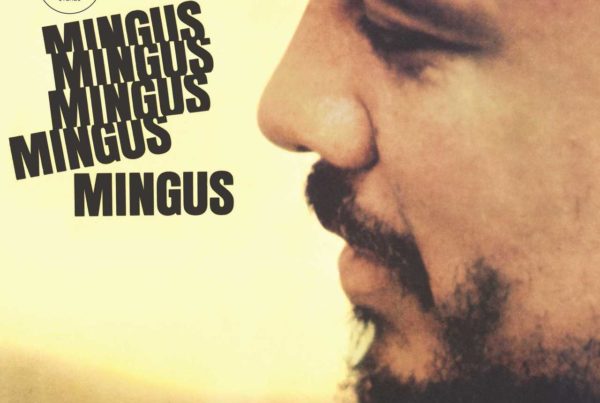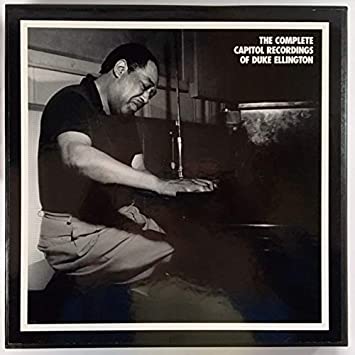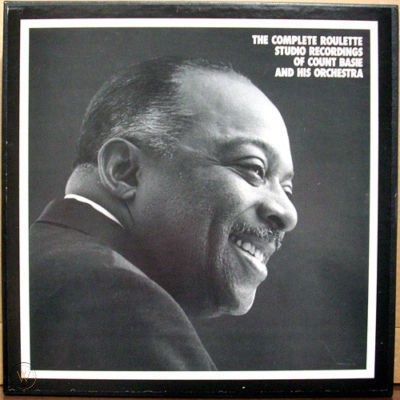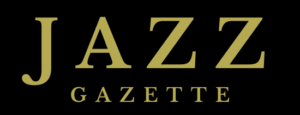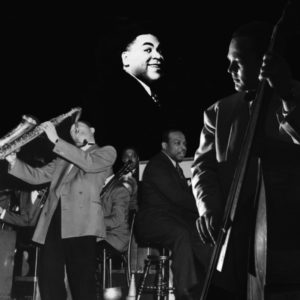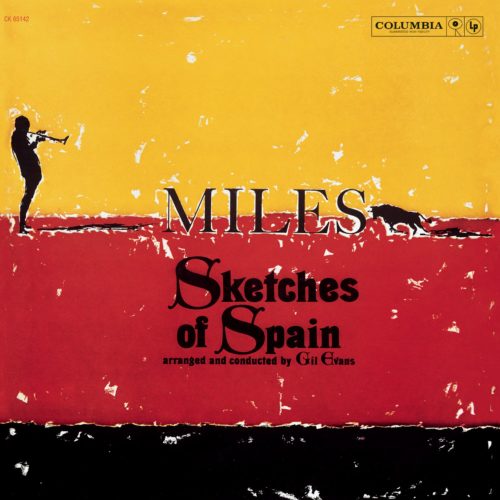
Miles Davis/Gil Evans The Complete Columbia Studio Recordings
Sketches of Spain
“Except for Duke Ellington at his best, nobody in the annals of jazz matches what Miles Davis and Gil Evans accomplished in the studios of Columbia Records from 1957-60.” – Fred Kaplan, Fi Magazine
Miles Davis & Gil Evans
By: Bill Kirchner
In this century’s American music, three partnerships have been most influential: Duke Ellington/Billy Strayhorn, Frank Sinatra/Nelson Riddle, and Miles Davis/Gil Evans. Of these, the Davis/Evans relationship lasted the longest—from 1947 until Evans’s death in 1988—and perhaps was the most interesting from the standpoint of personalities. “Modern music’s Mutt and Jeff,” as journalist Marc Crawford dubbed them, were indeed a contrasting pair: “the scholarly, soft-spoken Evans,” again in Crawford’s words, “and the sometimes volatile and always hard-spoken Miles Davis.”
But whatever their outward dissimilarities, the rapport between the two men was unique and deeply felt. Evans was Davis’s best friend, mentor, and musical alter-ego. He was one of the first musicians who recognized Davis’s unique gifts and was perhaps the only one who could match the trumpeter’s insatiable need for change and growth. In turn, Evans found in Davis his ideal interpreter, an artist whose strengths served as a focus for Evans’s most profound musical statements. Without underestimating in the least the recordings that Evans made on his own or with others, his work with Davis—beginning with the 1948-’50 Birth Of The Cool nonet and climaxing (though not concluding) with the Miles Ahead, Porgy And Bess, and Sketches Of Spain recordings—is clearly the music for which he will be best remembered.
The two men first met when Evans was arranging for the Claude Thornhill Orchestra and Davis was trumpeter for the Charlie Parker quintet. In his stints with Thornhill (1941-’42 and 1946-’48), Evans became the most venturesome writer for one of the most unorthodox bands of the swing era: an ensemble that featured a subdued, vibrato-less blend of French horns, tuba, clarinets, and flutes. Evans approached Davis for a lead sheet (melody and chord symbols) of the bebop anthem “Donna Lee” and subsequently scored it memorably for Thornhill. – liner notes Mosaic Records: Miles Davis/Gil Evans Complete Columbia (11 LPs)
Sketches of Spain
Miles Davis (flg, tp) Gil Evans (arr, cond), Ernie Royal, Bernie Glow, Louis Mucci, Taft Jordan (tp), Dick Hixon, Frank Rehak (tb), Jimmy Buffington, John Barrows, Earl Chapin (Fr h), Jimmy McAllister (tu), Al Block, Eddie Caine (fl), Romeo Penque (oboe), Harold Feldman (cl, oboe), Danny Bank (b cl), Jack Knitzer (bassoon), Janet Putnam (harp), Paul Chambers (b), Jimmy Cobb (d), Elvin Jones (perc), probably Jose Manguel (perc). – 30th Street Studio, NYC, November 20, 1959
The seminal Sketches Of Spain, had its genesis in a 1959 visit by Davis to the home of Joe Mondragon, a prominent Los Angeles jazz and studio bassist. Mondragon played the trumpeter a recording of “Concierto De Aranjuez”, a contemporary work for classical guitar and orchestra by Joaquin Rodrigo, and Davis was captivated by the melodic strength of the piece, particularly in the second (adagio) movement. Upon his return to New York, Davis played the disc for Evans, who shared his enthusiasm for recording the “Concierto”. Evans then began intensively researching Spanish and South American music in order to find enough material to fill an album.
Davis and Evans recorded Evans’s rewrite of the adagio movement of the “Concierto De Aranjuez” in November of 1959. Their interpretation is a relative rarity among jazz versions of European classical works. It’s not a lightweight reduction of the original; rather, it has at least as much depth—perhaps even more. And Daviss’ performance, on both flugelhorn and harmon-muted trumpet, is magnificent, particularly in its ability to sustain interest and maintain intensity during a 16-minute, multi-faceted piece.
All of the other works Davis and Evans chose for Sketches Of Spain were recorded in March of 1960 and also kept the participants on their toes. “Will O’ The Wisp” came from a 1915 ballet score by Manuel de Falla, El Amor Brujo. “The Pan Piper” was a Peruvian Indian theme that Evans heard while doing research for the project. In his original liner notes, Nat Hentoff wrote: “It’s a morning song and is probably sung at festival time as well as in ordinary diurnal circumstances. On the [folk] recording, the melody was played on the penny whistle by the local pig castrator who was whistling up business. Listen to the Joseph’s coat of colors behind Miles.”
An old Andalusian song, “Saeta” (“arrow”), gave Davis the opportunity for one of the singular performances of his career. It’s a musical recreation of a Good Friday religious ceremony: a street procession stops beneath a balcony where a lone woman sings of the Passion of Christ. The trumpets then signal the fanfare, and the procession moves on, leaving the woman in silence. Davis’s trumpet solo is his depiction of the woman’s emotional singing. Of this unforgettable musical monologue, Martin Williams wrote: “Miles Davis plays with a stark, deeply felt communal anguish that jazz has not heard since King Oliver.”
Again from Andalusia is “Solea” (from soledad, or “loneliness”), a quasi-flamenco tour de force where Davis injected his profound feeling for the blues. Also prominent were drummer Jimmy Cobb and percussionist Elvin Jones supplying jazz rhythms and additional classical percussionists playing tight flamenco snare drum rhythms. As Jack Chambers noted, “The two rhythmic pulses are felt alternately in a remarkable subtle exchange, the dominant flamenco rhythm subsiding imperceptibly until Davis and the orchestra are playing big band jazz in the middle section and then slipping as subtly back to flamenco by the end. The contending rhythms quite literally embody the musical forces at play throughout Sketches Of Spain and counterbalance them brilliantly.”
Also from these sessions, though not released until 1981, is “Song Of Our Country”, an anomalous, though effective, piece that sounds (except for use of the bassoon) closer in conception to “Blues For Pablo” than to anything on Sketches Of Spain. Davis is, to these ears, once again on trumpet. —Bill Kirchner
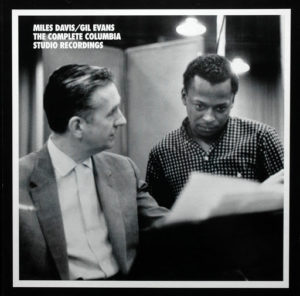
Miles Davis/Gil Evans The Complete Columbia Studio Recordings
Discography
_____________________________________________________
Record One – Side A:
1. Springsville (master) 3:27 (C/D/E)
(John Carisi)
2. The Maids Of Cadiz (master) 3:53 (A,D)
(Leo Delibes)
3. The Duke (master) 3:35 (A)
(Dave Brubeck)
4. My Ship (master) 4:28 (B,D)
(K. Weill-I. Gershwin)
5. Miles Ahead (master) 3:29 (B/E)
(M. Davis-G. Evans)
Record One – Side B:
1. Blues For Pablo (master) 5:18 (C)
(Gil Evans)
2. New Rhumba (master) 4:37 (C/E)
(Ahmad Jamal)
3. The Meaning Of The Blues (master) 2:48 (D)
(Troup-Worth)
4. Lament (master) 2:14 (D)
(J.J. Johnson)
5. I Don’t Wanna Be Kissed (By Anyone But You) (master) 3:06 (D/E)
(H. Spina-J. Elliott)
Record Two – Side A:
1. Springsville (remake take 7) 3:14 (D)
(John Carisi)
2. The Maids Of Cadiz (take 1) 3:54 (A)
(Leo Delibes)
3. The Duke (take 11) 3:30 (A)
(Dave Brubeck)
4. My Ship (take 1) 4:22 (B)
(K. Weill-I. Gershwin)
5. Miles Ahead (take 4) 3:28 (B)
(M. Davis-G. Evans)
Record Two – Side B:
1. Blues For Pablo (take 1) 5:25 (C)
(Gil Evans)
2. New Rhumba (take 5) 4:41 (C)
(Ahmad Jamal)
3. Medley: a. The Meaning Of The Blues (rehearsal take) 2:48 (D)
(Troup-Worth)
4. Medley: b. Lament (rehearsal take) 2:20 (D)
(J.J. Johnson)
5. I Don’t Wanna Be Kissed (By Anyone But You) (take 8) 3:12 (D)
(H. Spina-J. Elliott)
Record Three – Side A:
1. Buzzard Song (master) 4:07 (H)
(D. Heyward-I. Gershwin-G. Gershwin)
2. Bess, You Is My Woman Now (master) 5:10 (G)
(D. Heyward-I. Gershwin-G. Gershwin)
3. Gone (master) 3:37 (F)
(Gil Evans)
4. Gone, Gone, Gone (master) 2:03 (F)
(D. Heyward-I. Gershwin-G. Gershwin)
5. Summertime (master) 3:17 (H)
(D. Heyward-G. Gershwin)
Record Three – Side B:
1. Oh, Bess, Oh Where’s My Bess (master) 4:28 (H)
(D. Heyward-I. Gershwin-G. Gershwin)
2. Prayer (Oh Doctor Jesus) (master) 4:39 (H)
(I. Gershwin-G. Gershwin)
3. Fishermen, Strawberry and Devil Crab (master) 4:06 (G)
(D. Heyward-I. Gershwin-G. Gershwin)
4. My Man’s Gone Now (master) 6:14 (F)
(D. Heyward-G. Gershwin)
Record Four – Side A:
1. It Ain’t Necessarily So (master) 4:23 (G)
(I. Gershwin-G. Gershwin)
2. Here Come De Honey Man (master) 1:18 (G)
(D. Heyward-I. Gershwin-G. Gershwin)
3. I Loves You, Porgy (master) 3:39 (I)
(G. Gershwin)
4. There’s A Boat That’s Leaving Soon For New York (master) 3:23 (H)
(I. Gershwin-G. Gershwin)
5. Gone (take 3) 3:37 (F)
(Gil Evans)
6. Summertime (take 2) 3:16 (H)
(D. Heyward-G. Gershwin)
Record Four – Side B:
1. Prayer (Oh Doctor Jesus) (take 2) 4:14 (H)
(I. Gershwin-G. Gershwin)
2. I Loves You, Porgy (take 1, second version) 4:14 (I)
(G. Gershwin)
3. There’s A Boat That’s Leaving Soon For New York (take 2) 3:39 (H)
(I. Gershwin-G. Gershwin)
4. Oh, Bess, Oh Where’s My Bess (take 5) 4:21 (H)
(D. Heyward-I. Gershwin-G. Gershwin)
5. Gone (take 4) 3:40 (F)
(Gil Evans)
Record Five – Side A:
1. Concierto De Aranjuez (master) 16:19 (L)
(J. Rodrigo)
2. Will O’ The Wisp (master) 3:47 (M)
(M. De Falla)
Record Five – Side B:
1. The Pan Piper (master) 3:52 (M)
(Gil Evans)
2. Saeta (master) 5:06 (M)
(Gil Evans)
3. Solea (master) 12:15 (M)
(Gil Evans)
4. Song Of Our Country (issued take) 3:23 (M)
(Gil Evans)
Record Six – Side A:
1. Saeta (full version of master) 6:01 (M)
(Gil Evans)
2. The Pan Piper (take 1) 3:11 (M)
(Gil Evans)
3. Concierto De Aranjuez (part one, alternate take) 8:32 (K)
(J. Rodrigo)
4. Concierto De Aranjuez (part two, alternate take) 3:32 (L)
(J. Rodrigo)
5. Song Of Our Country (take 14) 3:10 (M)
(Gil Evans)
Record Six – Side B:
1. Song No. 2 1:36 (P)
(G. Evans-M. Davis)
2. Once Upon A Summertime 3:24 (P)
(Mercer-LeGrand-Marney-Barclay)
3. Aos Pes Da Cruz 4:15 (N)
(Pinto Goncalvas)
4. Song No. 1 4:33 (O)
(G. Evans-M. Davis)
5. Wait Till You See Her 4:03 (O)
(R. Rodgers-L. Hart)
6. Corcovado 2:42 (N)
(Antonio Carlos Jobim)
Record Seven – Side A:
1. Blue Xmas 2:40 (Q)
(Bob Dorough)
2. Nothing Like You 1:58 (Q)
(B. Dorough-F. Landesman)
3. Devil May Care 3:27 (R)
(Bob Dorough)
4. The Time Of The Barracudas 12:45 (S)
(G. Evans-M. Davis)
Record Seven – Side B:
1. Falling Water (take 4) 3:43 (T)
(G. Evans-M. Davis)
2. Falling Water (take 6) 4:22 (T)
(G. Evans-M. Davis)
3. Falling Water (take 8) 4:15 (T)
(G. Evans-M. Davis)
4. Falling Water (take 9) 4:18 (T)
(G. Evans-M. Davis)
Record Eight – Side A:
1. Springsville (take 5) 3:32 (C)
(John Carisi)
2. The Maids Of Cadiz (take 11) 4:06 (A)
(Leo Delibes)
3. The Maids Of Cadiz (take 11, insert 1) 2:36 (A)
(Leo Delibes)
4. Lament (medley: take 2) 2:35 (D)
(J.J. Johnson)
5. The Duke (take 1) 3:27 (A)
(Dave Brubeck)
6. I Don’t Wanna Be Kissed (By Anyone But You) (53225 issued version) 3:07 (D/E)
(H. Spina-J. Elliott)
Record Eight – Side B:
1. Springsville (rehearsal sequence) 6:58 (C)
(John Carisi)
2. Springsville (rehearsal with piano) 2:30 (C)
(John Carisi)
3. The Maids Of Cadiz (take 9) 0:32 (A)
(Leo Delibes)
4. The Maids Of Cadiz (take 10) 4:11 (A)
(Leo Delibes)
5. The Maids Of Cadiz (rehearsal sequence) 1:26 (A)
(Leo Delibes)
6. count off for The Duke (take 3) 0:35 (A)
7. The Duke (take 8) 3:31 (A)
(Dave Brubeck)
8. The Duke (piano take 3) 1:52 (D)
(Dave Brubeck)
Record Nine – Side A:
1. My Ship (take 6) 4:36 (B)
(K. Weill-I. Gershwin)
2. Miles Ahead (rehearsal sequence) 1:47 (B)
(M. Davis-G. Evans)
3. Miles Ahead (take 12) 3:30 (B)
(M. Davis-G. Evans)
4. Miles Ahead (take 15) 3:31 (B)
(M. Davis-G. Evans)
5. studio discussion 0:31 (B)
6. My Ship (take 7) 4:39 (B)
(K. Weill-I. Gershwin)
7. Miles Ahead (piano take) 3:06 (D)
(M. Davis-G. Evans)
Record Nine – Side B:
1. Blues For Pablo (rehearsal sequence) 5:53 (C)
(Gil Evans)
2. New Rhumba (take two) 4:38 (C)
(Ahmad Jamal)
3. Lament (take 1) 2:21 (D)
(J.J. Johnson)
4. I Don’t Wanna Be Kissed (By Anyone But You) (rehearsal) 2:10 (D)
(H. Spina-J. Elliott)
5. I Don’t Wanna Be Kissed (By Anyone But You) (take 5) 2:57 (D)
(H. Spina-J. Elliott)
6. studio discussion 0:33 (D)
7. I Don’t Wanna Be Kissed (By Anyone But You) (take 4, transitions) 2:58 (D)
(H. Spina-J. Elliott)
Record Ten – Side A:
1. studio discussion 0:19 (C)
2. Springsville (take 8 without overdubs) 3:35 (C)
(John Carisi)
3. studio discussion 0:07 (B)
4. Miles Ahead (take 11 without overdubs) 3:33 (B)
(M. Davis-G. Evans)
5. I Don’t Wanna Be Kissed (By Anyone But You) (take 3 without overdub) 2:59 (D)
(H. Spina-J. Elliott)
6. Springsville (overdub take 1) 2:08 (E)
(John Carisi)
7. Springsville (overdubbed solos 4 & 5) 2:20 (E)
(John Carisi)
8. Springsville (overdubbed solos 6-9) 2:32 (E)
(John Carisi)
9. Springsville (issued overdubbed solo) 0:27 (E)
(John Carisi)
Record Ten – Side B:
1. Miles Ahead (issued overdubbed solo) 1:54 (E)
(M. Davis-G. Evans)
2. Miles Ahead (overdubbed solo) 1:59 (E)
(M. Davis-G. Evans)
3. I Don’t Wanna Be Kissed (By Anyone But You) (overdubbed solo 1) 1:02 (E)
(H. Spina-J. Elliott)
4. I Don’t Wanna Be Kissed (By Anyone But You) (overdubbed solo 2) 1:26 (E)
(H. Spina-J. Elliott)
5. I Don’t Wanna Be Kissed (By Anyone But You) (overdubbed solo 4) 2:04 (E)
(H. Spina-J. Elliott)
6. I Don’t Wanna Be Kissed (By Anyone But You) (overdubbed solo 8) 3:05 (E)
(H. Spina-J. Elliott)
7. I Don’t Wanna Be Kissed (By Anyone But You) (overdubbed solo 19 & 19C) 2:57 (E)
(H. Spina-J. Elliott)
8. Miles Ahead (mono master) 3:30 (B/E)
(M. Davis-G. Evans)
Record Eleven – Side A:
1. Gone (rehearsal sequence) 2:54 (F)
(Gil Evans)
2. Gone, Gone, Gone (rehearsal sequence) 2:57 (F)
(D. Heyward-I. Gershwin-G. Gershwin)
3. studio discussion 0:53 (F)
4. Bess, You Is My Woman Now (rehearsal take) 4:58 (G)
(D. Heyward-I. Gershwin-G. Gershwin)
5. It Ain’t Necessarily So (take 1) 3:22 (G)
(I. Gershwin-G. Gershwin)
6. Oh, Bess, Oh Where’s My Bess (take 3) 3:53 (H)
(D. Heyward-I. Gershwin-G. Gershwin)
7. I Loves You, Porgy (rehearsal sequence) 2:19 (I)
(G. Gershwin)
Record Eleven – Side B:
1. There’s A Boat That’s Leaving Soon For New York (remake) 2:24 (I)
(I. Gershwin-G. Gershwin)
2. My Man’s Gone Now (remake take) 6:13 (I)
(D. Heyward-G. Gershwin)
3. Song Of Our Country (take 9) 2:59 (M)
(G. Evans)
4. Concierto De Aranjuez (rehearsal) 7:21 (J)
(J. Rodrigo)
5. Concierto De Aranjuez (alternate ending) 1:02 (L)
(J. Rodrigo)
(A) Miles Davis (flg) Gil Evans (arr, cond)
Ernie Royal, Bernie Glow, Louis Mucci, Taft Jordan, Johnny Carisi (tp), Frank Rehak, Jimmy Cleveland, Joe Bennett (tb), Tom Mitchell (b tb), Willie Ruff, Tony Miranda (Fr h), Bill Barber (tu), Romeo Penque (fl, cl, b cl, oboe), Sid Cooper (fl, cl), Lee Konitz (as), Danny Bank (b cl), Paul Chambers (b), Arthur Taylor (d).
Produced by George Avakian assisted by Cal Lampley
Recording engineer: Harold Chapman
30th Street Studio, NYC, Monday, May 6, 1957
_____________________________________________________________
(B) Miles Davis (flg) Gil Evans (arr, cond)
Ernie Royal, Bernie Glow, Louis Mucci, Taft Jordan, Johnny Carisi (tp), Frank Rehak, Jimmy Cleveland, Joe Bennett (tb), Tom Mitchell (b tb), Willie Ruff, Tony Miranda (Fr h), Bill Barber (tu), Romeo Penque (fl, cl, b cl), Sid Cooper (fl, cl), Lee Konitz (as), Danny Bank (b cl), Paul Chambers (b), Arthur Taylor (d).
Produced by George Avakian assisted by Cal Lampley
Recording engineer: Harold Chapman
30th Street Studio, NYC, Friday, May 10, 1957
________________________________________________________________
(C) Miles Davis (flg) Gil Evans (arr, cond)
Ernie Royal, Bernie Glow, Louis Mucci, Taft Jordan, Johnny Carisi (tp), Frank Rehak, Jimmy Cleveland, Joe Bennett (tb), Tom Mitchell (b tb), Willie Ruff, Jimmy Buffington (Fr h), Bill Barber (tu), Romeo Penque (fl, cl, b cl, oboe), Sid Cooper (fl, cl), Lee Konitz (as), Danny Bank (b cl), Paul Chambers (b), Arthur Taylor (d).
Produced by George Avakian assisted by Cal Lampley
Recording engineer: Harold Chapman
30th Street Studio, NYC, Thursday, May 23, 1957
_____________________________________________________________
(D) Miles Davis (flg) Gil Evans (arr, cond)
Ernie Royal, Bernie Glow, Louis Mucci, Taft Jordan, Johnny Carisi (tp), Frank Rehak, Jimmy Cleveland, Joe Bennett (tb), Tom Mitchell (b tb), Willie Ruff, Tony Miranda (Fr h), Bill Barber (tu), Romeo Penque (fl, cl, oboe), Eddie Caine (fl, cl), Lee Konitz (as), Danny Bank (b cl), Wynton Kelly (p), Paul Chambers (b), Arthur Taylor (d).
Produced by George Avakian assisted by Cal Lampley.
Recording engineer: Harold Chapman
30th Street Studio, NYC, Monday, May 27, 1957
______________________________________________________________
(E) Miles Davis {flg} overdubbing to previously recorded sections by the orchestra.
Producer: Cal Lampley.
Engineer: Fred Plaut
30th Street Studio, NYC, August 22, 1957
____________________________________________________________
(F) Miles Davis (flg) Gil Evans (arr, cond)
Ernie Royal, Bernie Glow, Johnny Coles, Louis Mucci (tp), Dick Hixon, Frank Rehak, Jimmy Cleveland, Joe Bennett (tb), Willie Ruff, Julius Watkins, Gunther Schuller (Fr h), Bill Barber (tu), Phil Bodner, Romeo Penque (fl, alto fl, cl), Cannonball Adderley (as), Danny Bank (alto fl, b cl), Paul Chambers (b), Philly Joe Jones (d).
Produced by Cal Lampley
Recording engineer: Frank Laico
30th Street Studio, NYC, July 22, 1958
____________________________________________________________
(G) Miles Davis (flg, tp -1) Gil Evans (arr, cond)
Ernie Royal, Bernie Glow, Johnny Coles, Louis Mucci (tp), Dick Hixon, Frank Rehak, Jimmy Cleveland, Joe Bennett (tb), Willie Ruff, Julius Watkins, Gunther Schuller (Fr h), Bill Barber (tu), Phil Bodner, Romeo Penque (fl, alto fl, cl), Cannonball Adderley (as), Danny Bank (alto fl, b cl), Paul Chambers (b), Jimmy Cobb (d).
Produced by Cal Lampley
Recording engineer: Frank Laico
30th Street Studio, NYC, July 29, 1958
_____________________________________________________
(H) Miles Davis (flg) Gil Evans (arr, cond)
Ernie Royal, Bernie Glow, Johnny Coles, Louis Mucci (tp), Dick Hixon, Frank Rehak, Jimmy Cleveland, Joe Bennett (tb), Willie Ruff, Julius Watkins, Gunther Schuller (Fr h), Bill Barber (tu), Jerome Richardson, Romeo Penque (fl, alto fl, cl), Cannonball Adderley (as), Danny Bank (alto fl, b cl), Paul Chambers (b), Jimmy Cobb (d).
Produced by Cal Lampley
Recording engineer: Frank Laico
30th Street Studio, NYC, August 4, 1958
____________________________________________________________
(I) Miles Davis (flg, tp -1) Gil Evans (arr, cond)
Ernie Royal, Bernie Glow, Johnny Coles, Louis Mucci (tp), Dick Hixon, Frank Rehak, Jimmy Cleveland, Joe Bennett (tb), Willie Ruff, Julius Watkins, Gunther Schuller (Fr h), Bill Barber (tu), Jerome Richardson, Romeo Penque (fl, alto fl, cl), Cannonball Adderley (as), Danny Bank (alto fl, b cl), Paul Chambers (b), Jimmy Cobb (d).
Produced by Cal Lampley
Recording engineer: Frank Laico
30th Street Studio, NYC, August 18, 1958
(J) personnel similar (L), but without Miles Davis
Produced by Teo Macero & John Hammond
Recording engineer: Fred Plaut
30th Street Studio, NYC, November 10, 1959
____________________________________________________________
(K) personnel similar to (L)
Produced by Teo Macero & Irving Townsend
Recording engineer: Fred Plaut
30th Street Studio, NYC November 15, 1959
__________________________________________________________
(L) Miles Davis (flg, tp) Gil Evans (arr, cond)
Ernie Royal, Bernie Glow, Louis Mucci, Taft Jordan (tp), Dick Hixon, Frank Rehak (tb), Jimmy Buffington, John Barrows, Earl Chapin (Fr h), Jimmy McAllister (tu), Al Block, Eddie Caine (fl), Romeo Penque (oboe), Harold Feldman (cl, oboe), Danny Bank (b cl), Jack Knitzer (bassoon), Janet Putnam (harp), Paul Chambers (b), Jimmy Cobb (d), Elvin Jones (perc), probably Jose Manguel (perc).
Produced by Teo Macero and Irving Townsend
Recording engineer: Fred Plaut
30th Street Studio, NYC, November 20, 1959
_______________________________________________________
(M) Miles Davis (tp) Gil Evans (arr, cond)
Ernie Royal, Bernie Glow, Louis Mucci, Johnny Coles (tp), Dick Hixon, Frank Rehak (tb), Jimmy Buffington, Joe Singer, Tony Miranda (Fr h), Bill Barber (tu), Al Block, Harold Feldman (fl), Romeo Penque (oboe), Danny Bank (b cl), Jack Knitzer (bassoon), Janet Putnam (harp), Paul Chambers (b), Jimmy Cobb (d), Elvin Jones (perc), probably Jose Manguel (perc).
Produced by Teo Macero
Recording engineer: Fred Plaut
30th Street Studio, NYC, March 10, 1960
_______________________________________________________________
(N) Miles Davis (tp) Gil Evans (arr, cond)
Ernie Royal, Bernie Glow, Louis Mucci, Harold Shorty Baker (tp),
J.J. Johnson, Frank Rehak (tb), Ray Alonge, Julius Watkins, prob. Don Corrado (Fr h), Bill Barber (tu), Steve Lacy (ss), Jerome Richardson, Al Block (fl), prob.Ray Beckenstein (fl, reeds), Bob Tricarico (bassoon), Garvin Bushell (bassoon, contrabassoon) prob. Janet Putnam (harp), Paul Chambers (b), Jimmy Cobb (d), Willie Bobo (bgos), Elvin Jones (perc). This probable personnel is derived from various sources and is not exact.
Produced by Teo Macero
Engineer: Fred Plaut
30th Street Studio, NYC, July 27, 1962
____________________________________________________
(O) similar to July 27, 1962 personnel:
Produced by Teo Macero
Engineer: Fred Plaut
30th Street Studio, NYC, August 13, 1962
_____________________________________________________
(P) similar to July 27, 1962 personnel:
Produced by Teo Macero
Engineer: Fred Plaut
30th Street Studio, NYC, November 6, 1962
________________________________________________
(Q) Miles Davis (tp), Frank Rehak (tb), Wayne Shorter (ts), Bob Dorough (p-1, vcl -2), Paul Chambers (b), Jimmy Cobb (d), Willie Bobo (bgos), Gil Evans (arr).
Produced by Teo Macero
Engineer: Fred Plaut
Columbia Studio A, NYC, August 21, 1962
______________________________________________________________
(R) Miles Davis (tp), Frank Rehak (tb), Wayne Shorter (ts), Paul Chambers (b), Jimmy Cobb (d), Willie Bobo (bgos), Gil Evans (arr).
Produced by Teo Macero
Engineer: Fred Plaut
Columbia Studio A, NYC, August 23, 1962
___________________________________________________________
(S) Miles Davis (tp), Gil Evans (arr, cond)
Dick Leith (b tb), Richard Perissi, Bill Hinshaw, Art Maeba (Fr h), Paul Horn (fl, alto fl, as), Buddy Collette (fl, alto fl, ts), Gene Cipriano (oboe, alto fl, ts), Fred Dutton (bassoon), Marjorie Call (harp), Herbie Hancock (p), Ron Carter (b), Tony Williams (d).
Produced by Irving Townsend
Columbia Studios, Hollywood, October 9/10, 1963
__________________________________________________________
(T) Miles Davis (tp), Gil Evans (arr, cond)
Julius Watkins, Ray Alonge (Fr h), Howard Johnson (tu), Wayne Shorter (ts), Hubert Laws (fl), prob. Danny Bank (fl, alto fl), Romeo Penque (Eng h), prob. Karl Porter (bassoon), Gloria Agostini or Betty Glauman (harp), Herb Bushler (Hawaiian gtr), Joe Beck (el gtr), Lawrence Lucie (mandolin), Herbie Hancock (Wurlitzer el p), Ron Carter (b), Tony Williams (d), Warren Smith (marimba, tympani).
Produced by Teo Macero
Engineer: Frank Laico
Columbia Studio B, NYC, February 16, 1968
Record One originally issued on Miles Ahead.
Record Three and Four A-1 through 4 originally issued on Porgy And Bess
Record Five, except for B-4 originally issued on Sketches Of Spain
Record Five, B-4 originally issued on Directions
Record Six, Side B originally issued on Quiet Nights
Record Seven, A-1 originally issued on Jingle Bell Jazz
Record Seven, A-2 originally issued on Sorcerer
Record Seven, A-3 originally issued on The Giants Of Jazz
Record Eight, A-6 originally issued on Miles Ahead (CD-53225)
Reissue producer: Phil Schaap (1957-60 sessions)
Remastering: Phil Schaap
Restoration & editing: Phil Schaap and Mark Wilder
Masters prepared by Mark Wilder
Additional engineering: Tom “Curly” Ruff
Reissue producer: Bob Belden (1962-68 sessions)
Remixing, editing and mastering: Mark Wilder
Executive producer: Michael Cuscuna
Series directors: Steve Berkowitz and Kevin Gore
Special thanks to Stephan Lazslo and the staff at the tape library, Risa Kantor and the staff at Sony Music Studios, Peter Smith and Ahmad Jamal.
Special Commendation: To Phil Schaap and Mark Wilder who went above and beyond the call of duty to restore these recordings. Their tireless dedication, research and expertise provided the opportunity for these masterpieces to be heard in their glorious splendor.
Note: The original tapes are starting to show their age. Miles Ahead session reels in particular have numerous dropouts – worn spots on the tape causing the audio to fade briefly. Besides an occasional dropout, the Porgy And Bess originals were cut up (heavily edited) while in production. Many trial edits and experiments in spliced takes were created. Not all the pieces were saved, nor were the uncut safety reels kept. Even previously unissued material contain scars and gaps from this process.

